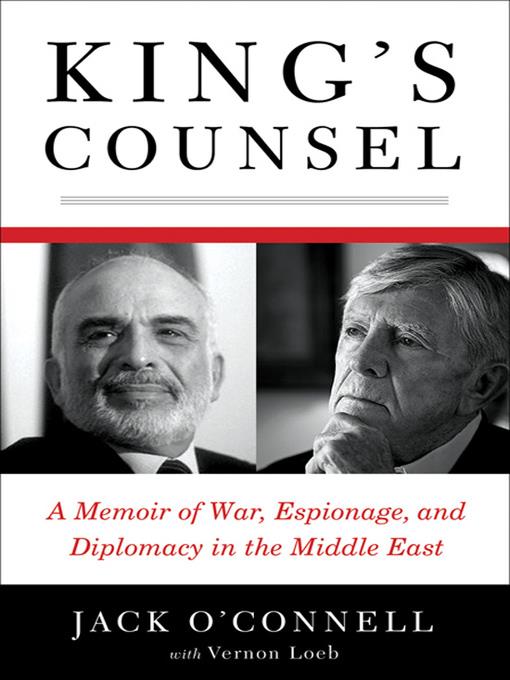
King's Counsel
A Memoir of War, Espionage, and Diplomacy in the Middle East
فرمت کتاب
ebook
تاریخ انتشار
2011
شابک
9780393088038
کتاب های مرتبط
- اطلاعات
- نقد و بررسی
- دیدگاه کاربران
نقد و بررسی

February 28, 2011
O'Connell, a former CIA agent and attorney for Jordan's King Hussein, recounts four decades of Middle East history in this provocative memoir. The author, CIA station chief in Amman from 1963 to 1971, was delegated to "keep King Hussein in power" and served as the young king's main point of contact and channel to the U.S. Following his retirement from the CIA, O'Connell became Hussein's U.S. attorney and Jordan's American lobbyist until the king's death in 1999. Drawing on his unique access, the author argues that while the Arabs wanted an end to hostilities and Hussein relentlessly pursued secret negotiations with the Israelis, neither Israel nor the U.S. wanted or actively pursued peace. O'Connell characterizes U.S. diplomacy in the region as hypocritical and charges that Kissinger fomented the 1973 Yom Kippur war. He also contends that the U.S. was doing Israel's "dirty work" in opposing Saddam Hussein in 1990 and could have negotiated an Iraqi withdrawal from Kuwait without resorting to war. O'Connell's eyewitness account of a tragic era in a tumultuous region is long on drama, revealing vignettes, and controversy, but short on balance. More than memoir, this is a passionate brief for King Hussein and the Arab pursuit of peace.

March 15, 2011
Insights about failed diplomacy in the Middle East by an American agent with a unique perspective.
After earning a law degree and a doctorate, the late O'Connell (1921–2010) joined the CIA and was stationed in Jordan in 1958, where he won the trust of King Hussein, a significant U.S. ally in the volatile Middle East. After leaving the CIA in the early '70s, the author joined his brother's law firm and became Hussein's Washington representative. The two men dealt with each other, in public and private, thousands of times. O'Connell came to see Hussein as the most likely broker of accord between the Jewish state of Israel and its Arab antagonists. But frequently his comrades at the CIA, as well as other U.S. government officials, seemed blinded to Hussein's potential as a peace broker because of political allegiances to Israel. Throughout the narrative, the author portrays many prominent American political figures as fools or liars, or both—including Henry Kissinger, Lyndon Johnson, Condoleezza Rice and George W. Bush. The memoir is bound to cause controversy within Israel and among Israeli supporters around the globe, given the author's rage at what he believes is a murderous state whose most influential leaders prefer war to peace. Despite the foibles of the CIA, O'Connell demonstrates little ill will, remaining a loyal alumnus.
A readable, potentially incendiary account that assumes a certain amount of prior knowledge about Middle East diplomacy, yet is coherent enough for novice readers to follow.
(COPYRIGHT (2011) KIRKUS REVIEWS/NIELSEN BUSINESS MEDIA, INC. ALL RIGHTS RESERVED.)

May 1, 2011
The late King Hussein of Jordan was the most loyal U.S. ally and a trusted CIA asset in the Arab world. Few Americans were as close to King Hussein as O'Connell, who served as CIA station chief in Jordan from 1963 to 1971 and was the Jordanian monarch's confidant, attorney, and diplomatic counselor in Washington, DC, for over three decades. In this highly readable book, O'Connell reminisces about his association with the king and recounts some of the most important political events that have affected Jordan, Arab-Israeli affairs, and U.S. relations with the Arab world. Throughout, O'Connell describes how King Hussein felt betrayed by his closest allies, providing interesting vignettes about the 1967 and 1973 Arab-Israeli wars; the drafting of UN Security Council Resolution 242, which remains the most important international framework for Arab-Israeli peace negotiations; and the Camp David Accords. The central theme of this memoir is that King Hussein was the Middle East's only genuine peacemaker, but he was repeatedly betrayed by the U.S. government, the Israelis, and even President Sadat of Egypt. VERDICT Both general readers and seasoned observers of the Middle East will find this book informative, good reading.--Nader Entessar, Univ. of South Alabama, Mobile
Copyright 2011 Library Journal, LLC Used with permission.

























دیدگاه کاربران